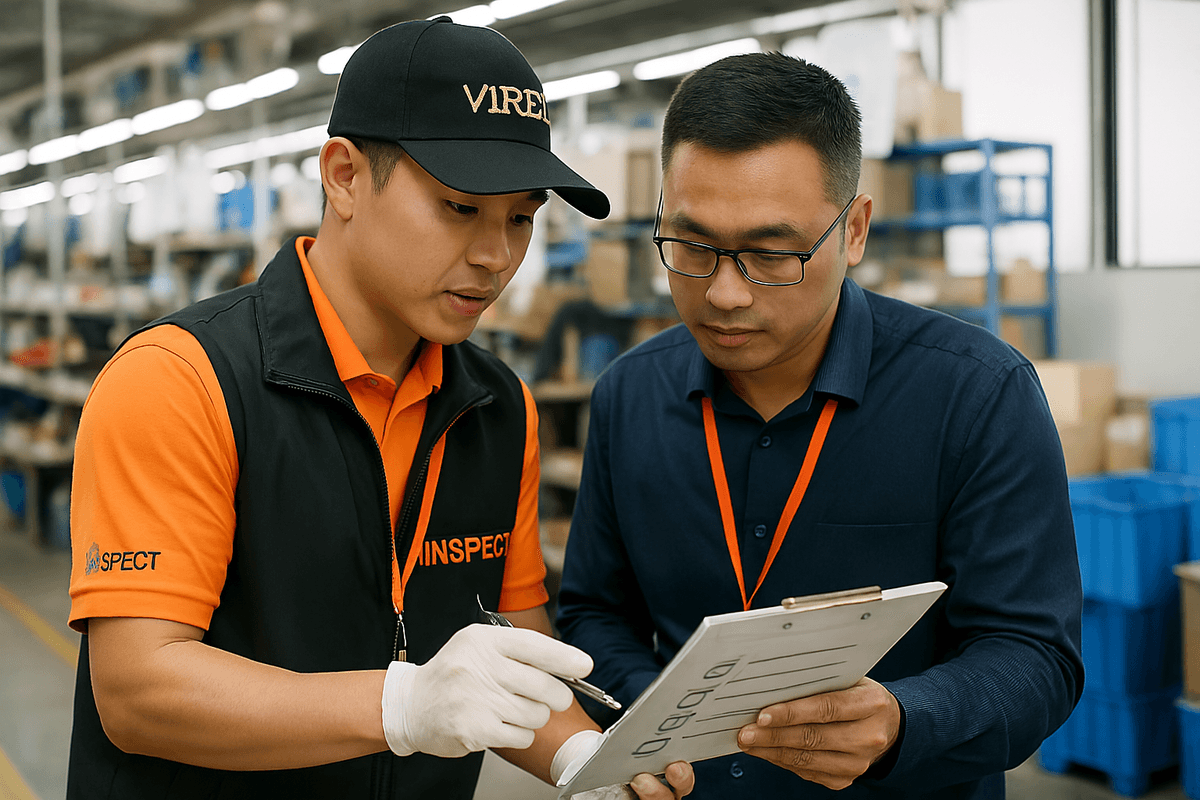Introduction

In today's dynamic business environment, social compliance audits have emerged as a critical component for organizations aiming to uphold ethical standards and operational integrity. These audits serve as a systematic evaluation of a company's adherence to social responsibility norms, ensuring that labor practices, environmental impact, and community relations align with established guidelines. Understanding the nuances of social compliance audits is essential for businesses seeking to navigate the complexities of global trade and maintain a positive reputation.
Understanding Social Compliance Audits
Social compliance audits are comprehensive assessments that evaluate a company's practices against specific social standards. These audits typically focus on areas such as labor rights, workplace safety, and environmental sustainability, ensuring that businesses not only comply with legal requirements but also foster ethical working conditions. A qualified social compliance auditor plays a pivotal role in this process, providing an objective evaluation that helps organizations identify gaps and implement necessary improvements.
Importance of Social Compliance for Businesses
The significance of social compliance cannot be overstated; it directly impacts a company's reputation and bottom line. Businesses that prioritize social compliance often experience enhanced brand loyalty, increased customer trust, and improved employee morale—all critical factors in today's competitive marketplace. Furthermore, maintaining high standards of audit and compliance can mitigate risks associated with legal issues or supply chain disruptions, ultimately leading to greater operational efficiency.
Role of Social Compliance Auditors
Social compliance auditors are the gatekeepers of ethical business practices; they ensure companies adhere to established standards while providing valuable insights into areas for improvement. These professionals not only assess current practices but also offer quality assurance by recommending actionable solutions tailored to each organization's unique needs. By partnering with experienced auditors from reputable compliance companies, businesses can enhance their overall audit quality and achieve lasting improvements in their operations.
What is a Social Compliance Audit?

Social compliance audits are essential tools for businesses aiming to ensure ethical practices within their supply chains. These audits assess adherence to social responsibility standards, ensuring that companies meet legal and ethical obligations concerning labor rights, workplace safety, and environmental impact. By engaging a social compliance auditor, organizations can identify risks and enhance their reputation while promoting fair treatment of workers.
Definition and Purpose
A social compliance audit is a systematic evaluation of a company's operations against established social responsibility standards. The primary purpose is to verify that the organization complies with labor laws, human rights regulations, and ethical guidelines set forth by various stakeholders. This process not only helps businesses mitigate risks but also fosters trust among consumers who increasingly demand transparency from brands.
Key Components of Social Compliance
Key components of social compliance include labor practices, workplace safety, environmental impact, and community engagement. A thorough audit examines factors such as employee wages, working hours, child labor policies, and health conditions in the workplace. Additionally, it evaluates how well the company communicates its commitment to social responsibility both internally and externally.
Common Standards and Frameworks
Several widely recognized standards guide social compliance audits, including the International Labour Organization (ILO) conventions, SA8000 certification, and ISO 26000 guidelines for social responsibility. These frameworks provide benchmarks against which companies can measure their performance in terms of ethical practices and worker rights protection. By aligning with these standards through a rigorous audit process conducted by experienced auditors from reputable compliance companies, organizations can enhance their credibility in the marketplace.
The Process of a Social Compliance Audit

Navigating the world of social compliance audits can feel like walking a tightrope, but understanding the process can make it much easier. A social compliance auditor plays a crucial role in ensuring that businesses adhere to ethical standards and regulations. This section will break down the steps involved, highlight the importance of quality assurance, and discuss what happens after an audit is completed.
Steps in Conducting an Audit
The journey of a social compliance audit begins with thorough planning and preparation. This initial step involves defining the scope of the audit, identifying key stakeholders, and determining which standards or frameworks will be assessed. Once these details are ironed out, auditors gather relevant documentation and data to get a comprehensive view of compliance practices within the organization.
Next comes the on-site evaluation where the social compliance auditor conducts interviews with employees, inspects working conditions, and reviews records to ensure everything aligns with established standards. This phase is critical for identifying any discrepancies or areas needing improvement. After collecting all necessary information, auditors analyze their findings to prepare for reporting.
Finally, the auditor compiles a detailed report summarizing their observations and recommendations for improvement. This report serves not only as documentation but also as a roadmap for enhancing future compliance solutions within the organization. With these steps completed, businesses can better understand their current standing regarding social compliance.
Role of Quality Assurance
Quality assurance is integral to maintaining high standards throughout the auditing process. It ensures that every step taken by auditors meets established criteria for accuracy and reliability in audit findings. By implementing robust quality assurance measures, companies can enhance auditor quality and build confidence in their assessment results.
A strong quality assurance framework includes regular training for social compliance auditors to keep them updated on industry best practices and evolving regulations. It also involves peer reviews where fellow auditors examine each other's work to ensure consistency and adherence to guidelines. This collaborative approach not only improves outcomes but fosters an environment where continuous improvement is prioritized.
Moreover, effective quality assurance helps organizations identify potential risks before they escalate into significant issues that could jeopardize compliance certification efforts down the line. By embedding quality checks into every stage of an audit, companies can safeguard against non-compliance while reinforcing their commitment to ethical business practices.
Post-Audit Actions and Recommendations
Once an audit concludes, it’s time for businesses to roll up their sleeves and tackle any identified issues head-on through actionable post-audit actions and recommendations from their social compliance auditor. These recommendations may include implementing new policies or revising existing ones based on findings related to labor practices or workplace safety conditions.
It’s vital that organizations treat these recommendations seriously; after all, ignoring them could lead not only to non-compliance but also damage reputations in today's socially conscious market landscape. Additionally, addressing concerns promptly helps maintain trust with stakeholders who expect companies to uphold high ethical standards.
Lastly, ongoing monitoring through regular follow-up audits ensures that improvements are sustained over time while keeping businesses aligned with evolving regulations in audit and compliance landscapes globally. By taking proactive steps post-audit—whether through enhanced training programs or improved operational procedures—companies can stay ahead of potential pitfalls while demonstrating their dedication toward achieving long-term success in social responsibility efforts.
Choosing the Right Compliance Company

Selecting the right compliance company to conduct your social compliance audits is no walk in the park. With so many options available, it’s crucial to identify an auditor who not only meets your specific needs but also aligns with industry standards. After all, a quality social compliance auditor can make or break your audit and compliance efforts.
Factors to Consider When Selecting an Auditor
When choosing a social compliance auditor, several factors should be at the forefront of your decision-making process. First and foremost, consider their experience in your specific industry—an auditor familiar with your sector will understand the unique challenges you face regarding compliance certification. Additionally, look for auditors who have a solid reputation for quality assurance; client testimonials and case studies can provide valuable insights into their effectiveness.
Another key factor is the range of services offered by the compliance company. A good auditor should not only conduct audits but also provide comprehensive compliance solutions that help you maintain ongoing adherence to standards. Finally, ensure that they are up-to-date with current regulations and frameworks; this will help safeguard against any potential pitfalls in audit and compliance.
Evaluating Auditor Quality
Evaluating auditor quality is essential for ensuring that you partner with a firm capable of delivering meaningful insights during the audit process. Start by reviewing their credentials—certifications and accreditations from recognized bodies can indicate a commitment to excellence in social compliance auditing. Moreover, inquire about their methodologies; effective auditors utilize structured approaches that enhance both accuracy and reliability during assessments.
Don’t underestimate the importance of communication skills as well; an effective social compliance auditor should be able to convey complex findings in straightforward terms so you can take actionable steps post-audit. Furthermore, consider their follow-up processes—do they offer support after completing an audit? A quality auditor will not only deliver results but also guide you on how to implement necessary changes for sustained compliance.
Benefits of Partnering with Experienced Firms
Partnering with experienced firms brings numerous advantages that extend beyond just meeting regulatory requirements for audit and compliance. For starters, seasoned auditors often have established relationships within various industries which can facilitate smoother interactions during audits—a significant plus when it comes time for any necessary adjustments or improvements in practices.
Additionally, experienced auditors are typically more adept at identifying potential risks before they escalate into larger issues, helping businesses save both time and money down the line. Their wealth of knowledge also means they can provide tailored advice on achieving long-term sustainability in your operations through ongoing quality assurance measures.
Finally, choosing a reputable firm enhances your brand's credibility as consumers increasingly favor businesses committed to ethical practices and transparency regarding their supply chains. By investing in a competent social compliance auditor now, you're laying down a solid foundation for future success while safeguarding against non-compliance risks down the road.
Real-World Examples of Social Compliance Audits

When it comes to social compliance audits, real-world examples provide a treasure trove of insights that can guide businesses in their own compliance journeys. These case studies not only highlight the effectiveness of a thorough audit but also demonstrate how a competent social compliance auditor can transform operations and enhance brand reputation. Let's dive into some inspiring stories that showcase the power of quality assurance in action.
Case Studies of Successful Audits
One notable case involved a prominent apparel manufacturer facing scrutiny over labor practices in its overseas factories. By engaging a reputable compliance company, they underwent an extensive social compliance audit that revealed gaps in worker safety and wage practices. Post-audit, the company implemented robust compliance solutions, resulting in improved working conditions and earning them a coveted compliance certification that boosted their marketability.
Another success story comes from a food processing giant that faced challenges with supply chain transparency. After hiring an experienced social compliance auditor, they conducted an audit that identified key areas for improvement regarding supplier labor standards and environmental impact. The subsequent changes not only ensured adherence to best practices but also fostered stronger relationships with suppliers who appreciated the commitment to ethical standards.
Impact on Business Operations
The impact of successful social compliance audits can be profound and far-reaching for businesses. For instance, companies that have achieved compliance certification often experience enhanced consumer trust, leading to increased sales and customer loyalty. Furthermore, by integrating quality assurance practices into their operations post-audit, these companies frequently report improved employee morale and productivity as workers feel valued and secure.
In another example, after addressing non-compliance issues identified during an audit, one electronics firm saw significant reductions in turnover rates among its workforce. This resulted in lower recruitment costs and better overall performance metrics across departments. Ultimately, these positive operational shifts underscore how effective audits can serve as catalysts for long-term business success.
Lessons Learned from Non-Compliance
While successful audits shine brightly, lessons learned from non-compliance cases are equally illuminating—if not more so! One infamous scenario involved a multinational corporation that ignored red flags raised during previous audits about labor conditions at its manufacturing plants abroad. The fallout was severe: public backlash led to boycotts and significant financial losses that could have been avoided had they prioritized auditor quality from the start.
Another cautionary tale features a tech company whose failure to adhere to social compliance standards resulted in hefty fines and legal battles due to unethical sourcing practices. This situation serves as a stark reminder of the importance of engaging experienced auditors who can provide valuable insights into potential risks before they escalate into crises requiring costly remediation efforts or damaging reputational harm.
In summary, these real-world examples illustrate both the benefits of effective social compliance audits and the potential pitfalls of neglecting this critical aspect of business operations. By learning from successes—and failures—companies can better navigate their paths toward sustainable growth while adhering to essential ethical standards.
Achieving Compliance Certification

Achieving compliance certification is a vital milestone for businesses aiming to demonstrate their commitment to social responsibility and ethical practices. This process not only validates adherence to established standards but also enhances a company's reputation in the global marketplace. A well-executed certification can significantly improve relationships with stakeholders, including customers, suppliers, and investors.
Overview of Certification Process
The certification process typically begins with a thorough audit conducted by a qualified social compliance auditor who assesses the organization's adherence to specific standards. This involves evaluating policies, procedures, and practices against established benchmarks such as the SA8000 or ISO 26000 frameworks. Once the audit is complete, findings are documented, and if necessary improvements are identified, businesses must implement corrective actions before receiving their compliance certification.
Following successful implementation of these changes, the auditor conducts a final review to ensure all requirements have been met satisfactorily. Upon approval, the organization is awarded its compliance certification, which serves as formal recognition of its commitment to social accountability and ethical business practices. However, achieving this status is just the beginning; ongoing efforts are essential for maintaining it.
Importance of Ongoing Compliance Solutions
Once an organization achieves compliance certification, it's crucial to recognize that this is not a one-time effort but rather an ongoing journey requiring sustained commitment through effective compliance solutions. Regular monitoring ensures that companies remain aligned with evolving standards and regulations while also addressing any emerging risks or challenges in their operations. By investing in continuous quality assurance processes and training programs for staff, businesses can foster an environment that prioritizes ethical practices at all levels.
Ongoing solutions also enhance transparency within supply chains by ensuring that suppliers adhere to similar standards of social responsibility. This proactive approach not only mitigates risks associated with non-compliance but also strengthens stakeholder trust over time. Ultimately, organizations that prioritize ongoing compliance solutions position themselves favorably in competitive markets while contributing positively to society.
Strategies for Maintaining Standards
To maintain high standards post-certification, organizations should adopt several key strategies tailored around audit and compliance best practices. First and foremost is establishing regular internal audits conducted by skilled personnel or external social compliance auditors who can provide unbiased assessments of current practices against set benchmarks. These audits help identify areas needing improvement before they escalate into more significant issues.
Additionally, fostering a culture of accountability throughout the organization encourages employees at every level to take ownership of their roles in maintaining compliance standards. Providing comprehensive training programs focused on ethical conduct ensures everyone understands their responsibilities related to social accountability within business operations—this includes everything from fair labor practices to environmental sustainability initiatives.
Lastly, leveraging technology can streamline monitoring efforts by automating data collection processes related to employee treatment or supplier conditions—making it easier than ever for companies to stay compliant without sacrificing efficiency or quality assurance measures along the way.
Conclusion
In the ever-evolving landscape of global trade, understanding social compliance is not just an option but a necessity for businesses aiming to thrive. Social compliance auditors play a pivotal role in ensuring that companies adhere to ethical practices, safeguarding their reputations while also contributing positively to society. The importance of quality assurance cannot be overstated; it ensures that audits are thorough and actionable, leading to effective audit and compliance strategies.
Key Takeaways on Social Compliance
Social compliance is fundamentally about aligning business operations with ethical standards and legal requirements. Companies that prioritize social compliance not only mitigate risks associated with non-compliance but also enhance their brand value and customer loyalty. Engaging a skilled social compliance auditor can streamline this process, providing insights into potential gaps while reinforcing the importance of ongoing quality assurance.
The Future of Auditing in Global Trade
As global trade continues to expand, the need for robust auditing practices will become even more pronounced. Businesses must adapt to emerging regulations and consumer expectations regarding ethical practices, making social compliance audits an integral part of their operational strategy. The future will likely see greater emphasis on auditor quality, as organizations seek partnerships with reputable compliance companies that can deliver comprehensive solutions tailored to their needs.
How China Inspection Pro Enhances Compliance Efforts
China Inspection Pro stands out as a leader in providing top-notch audit and compliance services tailored for businesses navigating the complexities of international trade. With a focus on enhancing auditor quality through rigorous training and adherence to industry standards, they ensure clients receive exceptional service every time. Their commitment to delivering effective compliance solutions empowers businesses not only to achieve compliance certification but also to maintain high standards over time.
